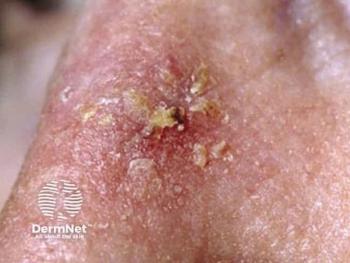
ALA PDT Long-Term Effect on Photoaging
In this study, researchers aim to find the long-term improvements on photoaging after ALA-PDT for AK.
The 5-aminolevulinic acid photodynamic therapy (ALA-PDT) is not only the first-line treatment for actinic keratosis (AK), but is demonstrated to improve photoaging during AK field treatment, according to a study published in Photodiagnosis and Photodynamic Therapy, which aimed to find out its long-term improvement effect on photoaging.1
The study included 10 patients with AK who were treated with field-directed ALA-PDT on 1 side of the face and lesion-direct ALA-PDT on the other. These cases were retrospectively reviewed, and the data was analyzed by clinical photographs and then evaluated with Global scores of photoaging (GSP). The data was analyzed by 2 dermatologists at baseline and 1-, 6-, and 24-months after ALA-PDT.
GSP evaluation was performed after 24 months of follow-up. Improvements in both fine line and mottled pigmentations were found (p < .05). All patients achieved complete response of AK lesions and had no relapse during the 24-month follow-up period.
“Photoaging can be effectively alleviated in the long-term follow-up after ALA-PDT treatment for AK,” the authors concluded. “The present study may inspire new treatment strategies for photoaging.”
Reference:
1. Long-term improvement on photoaging after ALA photodynamic therapy for actinic keratosis: A retrospective study. Photodiagnosis and Photodynamic Therapy. 2021;33:102181. doi:10.1016/j.pdpdt.2021.102181
Newsletter
Like what you’re reading? Subscribe to Dermatology Times for weekly updates on therapies, innovations, and real-world practice tips.











